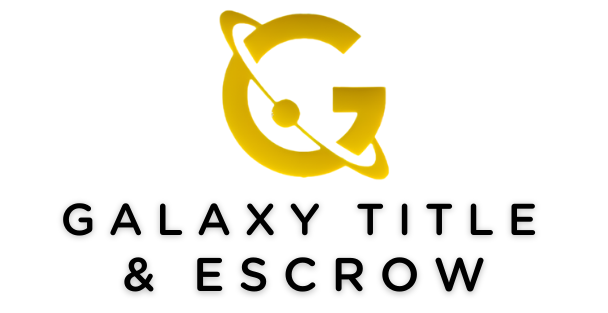What’s Included In Your Mortgage Payment
A mortgage payment is a regular payment made by homeowners to the lender from which they borrow money. This payment is to repay the home loan. Mortgage payments apply to other types of property, but most often are made on home loans. Galaxy Title & Escrow can help home buyers understand the costs associated with buying and owning a home.
A mortgage payment is made once a month, although you can make payments more frequently and pay off your mortgage sooner. Mortgages include four basic components:
- Principal
- Interest
- Taxes
- Insurance
The principal is the amount of money a lender or bank loans a homeowner to purchase the property. Essentially, when you buy a home, you’re borrowing money to buy the property and then the principal is the initial amount of that loan. A portion of the mortgage payment is applied to the principal to pay off this amount over time.
The entirety of your mortgage payment doesn’t go toward paying off the initial loan because there are other expenses associated with homeownership, such as property tax and insurance. By paying money every month and applying it to the principal, you build equity in your home and eventually become the sole owner.
Interest included in a mortgage payment is based on the interest rate on the loan and the remaining principal balance. Each month, when you pay your mortgage, part of your payment is for the interest on your loan. When looking for loans to apply for, it’s important to pay attention to the interest rate. A lower interest rate is best because it means you pay less over the life of your loan. There are also types of interest rates to consider:
- Fixed-rate mortgages: A fixed-rate means that your interest rate will remain the same for the entire life of your loan, which is usually 15 or 30 years. Often this is the best option because it means your mortgage payments will barely fluctuate if it changes at all, and it will be easier to budget for your mortgage payments.
- Adjustable-rate mortgages: With this type of mortgage, your interest rate is fixed for a certain amount of time, usually 5-10 years, then it may adjust annually depending on market conditions. This means your mortgage payment may increase or decrease over the lifetime of the loan.
- Interest-only mortgage: With an interest-only mortgage, you only make payments for the interest portion of your loan for a specified amount of time. After that period, you will need to start making payments toward the principal, which increases your monthly payment significantly.
- Government-backed mortgages: This includes FHA and VA loans that offer lower interest rates and flexible credit requirements. If you meet the requirements to get approved for this type of interest rate and mortgage, then you will probably have a lower mortgage payment. However, an FHA and VA loan may not qualify you for a higher price range of homes.
You can compare interest rates and loan terms from multiple lenders to ensure you get the best option for your financial needs.
When you own a home or are paying a mortgage on a property, you’re responsible for property taxes. Mortgage payments often include your tax payments, but property tax is only due once or twice a year. When you make a mortgage payment, your lender put a portion of your payment in an escrow account.
When taxes are due, your lender uses funds from your escrow to pay the taxes on your behalf. The amount of taxes you owe depends on the value of your home and local tax rates. This may fluctuate annually.
It’s beneficial to have an escrow account because it helps you budget for your property taxes and ensures that your taxes are paid on time. Since property tax rates can change over time, it’s important to understand how this may affect your monthly payment.
The insurance portion of your mortgage payment includes homeowners’ insurance, which is typically required when you buy a house. Homeowners’ insurance covers the expenses of fixing damage caused by fire, theft, or natural disasters. Often, to pay homeowners’ insurance, you pay a premium once a year. Like with property tax, a portion of your monthly payment goes into an escrow account and when the insurance is due, your lender pays the premium using these funds.
You can shop around with different insurance providers to get the best price and coverage for your home. Consider where you live and the condition of your home to determine what coverages you need included in your policy. For example, in parts of Southern Florida, flooding is a concern and you will want good flood damage coverage included in your homeowners’ insurance policy.
How To Budget For Buying a Home
A house or property is a large expense that requires financial planning. You can check out our homebuyer’s guide to learn about special considerations you may have when searching for a home. Among the list of things to do while preparing to buy a house, is to prepare a monthly budget. Here are some tips on how to budget for buying a home:
- Determine how much house you can afford: Before you start shopping for homes, it’s important to figure out how much you can afford to spend. A general rule of thumb is to keep your housing expenses, including your mortgage payment, property taxes, and homeowners’ insurance, to no more than 30% of your gross monthly income.
- Consider all the costs of homeownership: In addition to your mortgage payment, you will pay utilities, maintenance repairs, groceries, and various types of entertainment each month. Consider if you need to make any special purchases for the home, such as appliances or equipment for lawn care. There may also be HOA fees to consider.
- Save for a down payment: Depending on the type of mortgage you choose, you may need to make a down payment of anywhere from 3% to 20% of the purchase price of the home. You can set up a savings account that is designated for your down payment to help you save.
How Galaxy Title & Escrow Helps Homeowners

Our team at Galaxy Title & Escrow has over a decade of experience in the industry and has helped many homeowners find the home of their dreams. We understand the ins and outs of real estate transactions and can help prepare you for home ownership.
When you’re buying a home, our team provides escrow closing services, which protect your funds and hold deposits for various costs associated with closing on a home. We also help you get title insurance, complete paperwork, schedule home inspections, and can provide advice for each step of the home-buying process. Call today to discuss how we can make your real estate transaction as stress-free as possible.



 Mortgage lenders work with homebuyers to assess their creditworthiness and financial situation before approving them for a loan. They may look at factors such as income, employment history, and debt-to-income ratio to determine whether or not a buyer is a good candidate for financing. Additionally, mortgage lenders typically work closely with
Mortgage lenders work with homebuyers to assess their creditworthiness and financial situation before approving them for a loan. They may look at factors such as income, employment history, and debt-to-income ratio to determine whether or not a buyer is a good candidate for financing. Additionally, mortgage lenders typically work closely with  As your escrow company
As your escrow company